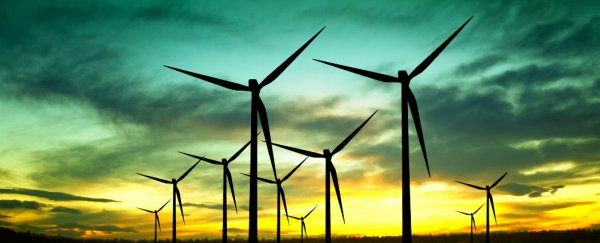Economic growth no longer has to be coupled with higher levels of pollution, a new report has shown, stating that despite the 3 percent growth in the global economy last year, carbon emissions remained unchanged.
Commissioned by the France-based Renewable Energy Policy Network for the 21st Century (REN21), the organisation cites China's record-breaking uptake of renewable energy sources as the driving force behind this really encouraging development. "The landmark 'decoupling' of economic and CO2 growth is due in large measure to China's increased use of renewable resources, and efforts by countries in the OECD to promote more sustainable growth- including increased use of energy efficiency and renewable energy," the report states.
According to the report, in terms of dollars spent on renewable energy, the leading countries for investment were China, the United States, Japan, the United Kingdom, and Germany. The team behind it says that solar PV capacity has grown "at the most phenomenal rate" - up 48-fold from 2004 (3.7 GW) to 2014 (177 GW), and wind power capacity has seen an eight-fold increase in that same period.
The report states that global new investment in renewable power and fuels increased 17 percent over 2013, and was more than twice that of investment in net fossil fuel power capacity during that time, "continuing the trend of renewables outpacing fossil fuels in net investment for the fifth year running".
Thanks to the great long-term investment renewables can offer, the developing world has also increased its uptake - the report cites a 36 percent increase for 2014 from the previous year to US131.3 billion, with Burundi, Kenya, Honduras, Jordan, and Uruguay being cited as the leading countries in the world for investments relative to per capita GDP.
"China accounted for 63 percent of developing country investment, while Chile, Indonesia, Kenya, Mexico, South Africa and Turkey each invested more than US1 billion in renewable energy," says the report.
According to Fred Pearce at New Scientist, not only is China now the biggest installer in the world of wind, solar and hydroelectric power plants, in 2014, for the first time, it managed to reduce its rate of coal burning. China's steady economic growth in the face of reduced fossil fuel use has been an extremely encouraging development, and Pearce reports that an analysis earlier this week by the International Energy Agency predicts that, "thanks to renewables and growing energy efficiency, an 88 percent growth in the global economy by 2030 may be accompanied by emissions growth of just 8 percent".
Maybe we're not so doomed after all.
